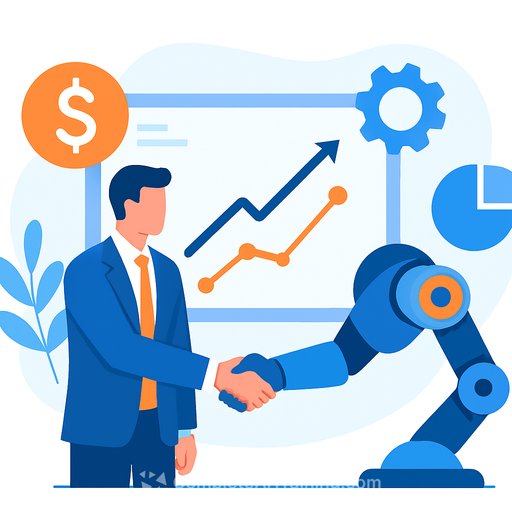CoreWeave acquires Monolith AI: Faster, smarter decisions for product teams
CoreWeave has acquired Imperial spinout Monolith AI, bringing its engineering-focused AI tools to CoreWeave's cloud platform. The move aims to put anomaly detection, test plan optimisation, and next-test recommendation directly into the hands of engineers-without forcing teams to build in-house AI expertise.
Monolith was born from PhD research by Dr Richard Ahlfeld in Imperial's Department of Aeronautics. His work with NASA on flight physics and uncertainty quantification informed a practical approach to applying machine learning in high-stakes engineering environments.
What Monolith brings to product development
- Anomaly detection to flag unexpected behaviour in test data before it becomes a field issue.
- Test plan optimisation to reduce redundant trials and focus on the most informative experiments.
- Next-test recommendation to guide the fastest path to validation with fewer prototypes.
Since 2016, Monolith has worked with teams at Nissan, BMW, and Honeywell, and delivered results across motorsports, automotive, aerospace, and battery systems. The throughline: shorten feedback loops between simulation, test, and design decisions.
Why the CoreWeave deal matters
Offering Monolith through CoreWeave's AI cloud gives engineering orgs elastic compute and easier access to models tuned for physics-heavy problems. According to CoreWeave, pairing its infrastructure with Monolith's simulation and machine learning capabilities will help manufacturers cut R&D time and accelerate product design cycles.
"Every leader we meet across the industrial and manufacturing sectors knows AI can transform their business," said Brian Venturo, co-founder and chief strategy officer at CoreWeave. "What they need are the right tools to use the technology to solve intractable physics and engineering problems. Those challenges have historically slowed industrial innovation, and Monolith has closed that gap."
Founder perspective
"Monolith was founded to put AI directly into the hands of engineers, enabling them to create breakthrough technologies," said Dr Ahlfeld, co-founder and CEO. His NASA experience helped shape an approach built for reliability and traceability in safety-critical environments.
CoreWeave brings the scale to take that approach into more labs, dynos, wind tunnels, and production lines. For background on Dr Ahlfeld's early research influence, see NASA Aeronautics.
Where teams are applying it
- Vehicle and e-mobility: prioritising durability and thermal tests; predicting battery pack life to cut lengthy degradation campaigns.
- Aerospace: guiding which wind-tunnel or computational runs to schedule next based on information gain.
- Manufacturing: detecting process drift and outliers earlier using high-dimensional test data.
Monolith has also partnered with About:Energy to predict how long EV battery packs will last-helping carmakers reduce costs by outsourcing complex test plans that are usually completed in-house.
Practical takeaways for product development leaders
- Make test data your advantage: start by centralising historical test results and metadata (conditions, fixtures, sensor maps).
- Pilot on your costliest tests: apply next-test recommendation where prototypes, track time, or long-duration cycles are most expensive.
- Instrument for learning, not just pass/fail: capture richer signals (temperatures, vibrations, currents) to enable anomaly detection.
- Lean on cloud for burst capacity: run model training and batch simulations without derailing lab schedules.
- Keep verification tight: pair model suggestions with engineering guardrails and clear acceptance criteria.
How to get value in 90 days
- Weeks 1-2: Pick one program and two target KPIs (e.g., test-cycle time, prototypes per build). Assemble a minimal dataset from the last program phase.
- Weeks 3-6: Trial anomaly detection and next-test recommendation against a live test queue. Track escaped defects and test count.
- Weeks 7-12: Expand to a second subsystem; compare validation time and cost versus your historical baseline. Lock in a rollout plan if ROI is clear.
Imperial connections and growth
Monolith was co-founded by Dr Ahlfeld and Professor Francesco Montomoli. Early on, a £30,000 Techcelerate grant funded global customer discovery rather than product development-sharpening the company's focus on real engineering needs.
Funding milestones followed: a £1.9m seed round in 2019, an £8.5m Series A in 2021, and a £21m Series B in 2025. In 2022, Monolith became a research partner at Imperial, working with the Dyson School of Design Engineering on manufacturability via a £500,000 Innovate UK grant.
"Seeing Richard's journey with Monolith AI-from early customer and market discovery in the first Techcelerate cohort to this significant acquisition-validates the power of deeply understanding the engineering market's needs," said Hiten Thakrar, head of the SuperConnector entrepreneurship programmes. Dr Ahlfeld adds: "I'd strongly encourage new students to explore their entrepreneurial options and test their ideas, rather than heading straight into consulting or banking."
Upskill your team
If you're building product with AI in the loop, level up your team's skills. Explore practical AI learning paths for product and engineering roles at Complete AI Training: Courses by Job.
Or scan the latest hands-on programs to speed up adoption: Latest AI Courses.
Your membership also unlocks:






